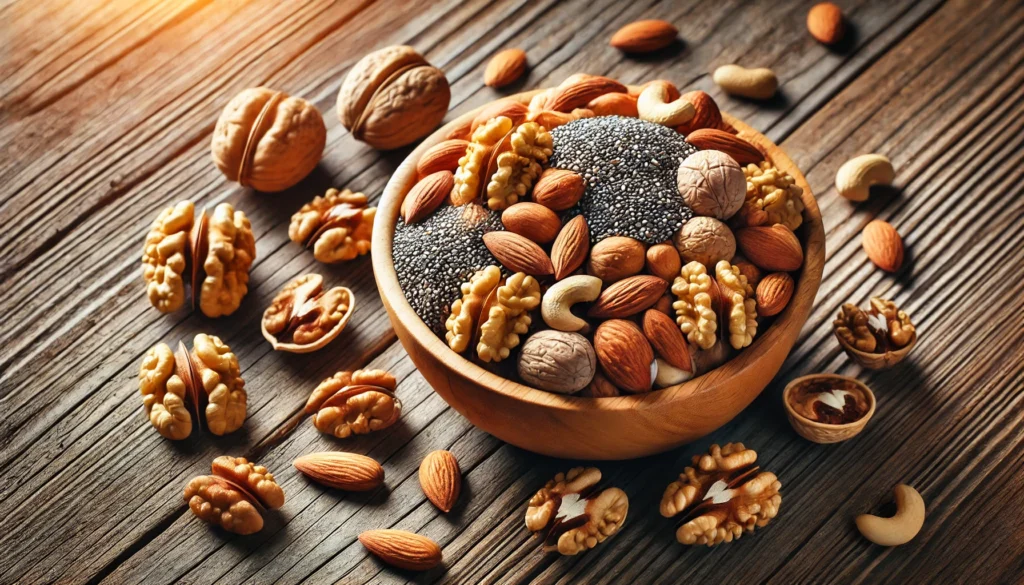In today’s fast-paced world, maintaining cognitive health is more essential than ever. As our understanding of dementia evolves, we recognize that nutrition plays a pivotal role in supporting brain function and potentially mitigating the onset of dementia-related symptoms. This article delves into the intricate relationship between diet and cognitive health, offering insights into the best foods for dementia sufferers.
You may also like: Top Foods to Enhance Your Memory
Understanding Dementia and Nutrition
Dementia is an umbrella term for a range of cognitive impairments, including Alzheimer’s disease. Research suggests a strong correlation between nutrition and cognitive function, highlighting the potential for certain dietary choices to bolster brain health. Let’s explore how specific foods can help protect the brain and improve quality of life for those affected by dementia.
The Complexity of Dementia
Dementia encompasses a variety of conditions characterized by cognitive decline. Alzheimer’s disease, vascular dementia, and Lewy body dementia are just a few examples. Each type of dementia has unique pathology but shares common symptoms such as memory loss, impaired judgment, and personality changes. Understanding the diversity within dementia helps tailor nutritional strategies to specific needs.
Nutritional Neuroscience: The Emerging Field
Nutritional neuroscience is an evolving field that examines how nutrients influence brain health. Researchers are uncovering how vitamins, minerals, and other dietary components impact the brain’s structure and function. This burgeoning science highlights the potential for diet-based interventions to prevent or slow cognitive decline, offering hope for those at risk of dementia.
Global Dietary Patterns and Dementia Risk
Studies have shown that populations with diets rich in whole foods and low in processed foods tend to have lower rates of dementia. Traditional diets, like the Mediterranean and Japanese diets, emphasize fresh produce, lean proteins, and healthy fats, all of which support cognitive health. These findings underscore the importance of dietary patterns in managing dementia risk globally.
The Role of Diet in Cognitive Health
The brain, a highly metabolic organ, requires a steady supply of nutrients to function optimally. A diet rich in antioxidants, healthy fats, vitamins, and minerals can support brain function and potentially delay the progression of dementia. Emphasizing whole, nutrient-dense foods while minimizing processed and inflammatory foods is crucial for maintaining cognitive vitality.
Antioxidants: The Brain’s Defense Mechanism
Antioxidants neutralize free radicals, unstable molecules that can damage cells, including brain cells. Foods high in antioxidants, such as fruits and vegetables, protect the brain from oxidative stress, which is linked to cognitive decline. Regular consumption of antioxidant-rich foods helps maintain neuronal health and may reduce the risk of dementia.
Healthy Fats: Building Blocks for the Brain
Healthy fats, such as omega-3 fatty acids, are essential for maintaining the brain’s structure and function. These fats are integral to cell membranes and play a critical role in neurotransmission. Incorporating sources of healthy fats, like fish and nuts, into the diet can enhance cognitive function and potentially delay dementia onset.
Vitamins and Minerals: Essential Nutrients for Brain Function
Certain vitamins and minerals, including B vitamins, vitamin D, and magnesium, are vital for cognitive health. These nutrients support various brain functions, from energy production to synaptic transmission. Ensuring adequate intake of these vitamins and minerals through a balanced diet can help preserve cognitive abilities and reduce dementia risk.
Foods to Incorporate for Dementia Prevention
Berries: Nature’s Antioxidant Powerhouses
Berries, particularly blueberries, strawberries, and blackberries, are packed with flavonoids—natural compounds with anti-inflammatory and antioxidant properties. Studies have shown that regular consumption of berries can improve memory and slow cognitive decline. These vibrant fruits help reduce oxidative stress and inflammation, both of which are implicated in dementia.
The Science Behind Berries and Brain Health
Research indicates that the flavonoids in berries can cross the blood-brain barrier, directly influencing brain function. These compounds enhance neuronal communication and stimulate the production of new brain cells. The beneficial effects of berries are not limited to the elderly; they can also support brain health in younger populations.
Incorporating Berries into Daily Diet
Incorporating berries into your diet is simple and versatile. Add them to breakfast cereals, smoothies, or salads for a nutrient boost. Fresh, frozen, or dried—berries retain their health benefits in various forms. Regularly consuming a variety of berries ensures a diverse intake of antioxidants beneficial for brain health.
Beyond Berries: Other Antioxidant-Rich Fruits
While berries are exceptional, other fruits like oranges, grapes, and pomegranates also offer substantial antioxidant benefits. These fruits can complement berries in your diet, providing a wider range of protective compounds. Diversifying fruit intake can enhance overall antioxidant consumption, supporting long-term cognitive health.

Leafy Greens: The Brain’s Best Friend
Leafy greens such as spinach, kale, and Swiss chard are rich in brain-boosting nutrients like folate, vitamin K, and lutein. These nutrients are known to support brain health by reducing inflammation and preserving cognitive function. A study in “Neurology” found that individuals who consumed one to two servings of leafy greens daily had the cognitive abilities of people 11 years younger.
Nutritional Profile of Leafy Greens
Leafy greens are nutritional powerhouses, offering a range of vitamins, minerals, and phytonutrients. Folate, for example, is crucial for DNA synthesis and repair, processes vital for brain health. Regular consumption of leafy greens ensures a steady supply of these essential nutrients, supporting cognitive function over the lifespan.
Creative Ways to Include Leafy Greens
Incorporating leafy greens into meals can be both delicious and creative. Use them as a base for salads, blend them into smoothies, or add them to soups and stews. Experimenting with different preparation methods can make leafy greens a staple in your diet, providing consistent benefits for brain health.
The Role of Lutein in Cognitive Function
Lutein, a carotenoid found in leafy greens, is linked to improved cognitive performance. This nutrient accumulates in the brain and eyes, where it acts as an antioxidant and anti-inflammatory agent. Regular consumption of lutein-rich foods may enhance cognitive abilities and protect against age-related cognitive decline.
Fatty Fish: Omega-3 Fatty Acids for Brain Protection
Omega-3 fatty acids, prevalent in fatty fish like salmon, mackerel, and sardines, are vital for brain health. They support neuronal communication, reduce inflammation, and may help prevent the formation of amyloid plaques, which are characteristic of Alzheimer’s disease. Regular intake of omega-3-rich fish has been associated with a reduced risk of dementia and improved cognitive performance.
The Biological Impact of Omega-3s
Omega-3 fatty acids, particularly EPA and DHA, are crucial for maintaining the brain’s structural integrity. They are involved in cell membrane fluidity and neurotransmitter function, influencing mood and cognition. Supplementing with omega-3s or consuming fish regularly can have profound effects on brain health and function.
Sustainable Sources of Omega-3s
While fatty fish are excellent omega-3 sources, concerns about sustainability and mercury content exist. Alternatives include plant-based sources like flaxseeds, chia seeds, and walnuts. Algal oil supplements, derived from algae, offer a sustainable, vegan-friendly omega-3 option, ensuring adequate intake without environmental concerns.
Cooking Tips to Preserve Omega-3s
To maximize the benefits of omega-3s, it’s essential to preserve their integrity during cooking. Opt for gentle cooking methods like steaming, poaching, or baking rather than frying. These techniques maintain the nutritional value of fish, allowing you to reap the full cognitive benefits of omega-3s.
Foods to Limit or Avoid
Refined Carbohydrates and Sugars
High consumption of refined carbohydrates and sugars can lead to insulin resistance, which has been linked to cognitive decline. These foods contribute to inflammation and oxidative stress, exacerbating dementia symptoms. Instead, focus on complex carbohydrates, such as whole grains, which provide a steady release of glucose for brain energy.
The Impact of Insulin Resistance on the Brain
Insulin resistance, a hallmark of Type 2 diabetes, can also affect brain health. It impairs glucose metabolism in the brain, leading to energy deficits and cognitive dysfunction. Managing carbohydrate intake and focusing on low-glycemic options can help maintain insulin sensitivity, supporting cognitive health.
Strategies to Reduce Sugar Intake
Reducing sugar intake involves more than just avoiding sweets. Many processed foods contain hidden sugars, contributing to overall consumption. Reading labels, cooking at home, and opting for natural sweeteners like honey or maple syrup can help reduce sugar intake and its negative impact on the brain.
Benefits of Whole Grains for Cognitive Health
Whole grains, like oats, quinoa, and brown rice, are rich in fiber and essential nutrients. They provide a steady source of energy, preventing blood sugar spikes and crashes that can affect cognitive function. Incorporating whole grains into your diet supports long-term brain health and reduces dementia risk.
Trans Fats and Saturated Fats
Trans fats and excessive saturated fats can negatively impact brain health by promoting inflammation and impairing blood flow to the brain. Limiting the intake of processed foods, fried foods, and high-fat dairy products can reduce these risks. Opt for healthier fat sources, like avocados, nuts, and olive oil.
The Dangers of Trans Fats
Trans fats, often found in processed and fried foods, are associated with increased inflammation and oxidative stress. They can disrupt cell membrane function and impair neuronal communication. Eliminating trans fats from the diet is crucial for maintaining brain health and preventing cognitive decline.
Understanding Saturated Fats and Their Effects
While some saturated fats are necessary, excessive intake can lead to cardiovascular issues affecting brain health. Saturated fats increase cholesterol levels, narrowing blood vessels and reducing cerebral blood flow. Balancing saturated fat intake with healthier fats supports both heart and brain health.
Healthier Alternatives to Unhealthy Fats
Replacing unhealthy fats with healthier options is key to supporting cognitive function. Use olive oil for cooking, snack on nuts and seeds, and incorporate avocados into meals. These sources provide monounsaturated and polyunsaturated fats, which are beneficial for brain health and overall well-being.

The Alzheimer’s Diet: A Practical Approach
The Mediterranean Diet
The Mediterranean diet, rich in fruits, vegetables, whole grains, and healthy fats, has long been associated with a reduced risk of dementia. Its emphasis on antioxidant-rich foods and omega-3 fatty acids supports brain health and cognitive function. Incorporating elements of this diet can be a practical and effective strategy for dementia prevention.
Key Components of the Mediterranean Diet
The Mediterranean diet is characterized by its emphasis on plant-based foods, lean proteins, and healthy fats. Olive oil is a staple, providing monounsaturated fats that support heart and brain health. Understanding the key components of this diet can guide individuals in making healthier food choices.
Benefits of the Mediterranean Diet for Brain Health
Research consistently shows that the Mediterranean diet is linked to improved cognitive function and reduced dementia risk. Its anti-inflammatory and antioxidant properties protect against neuronal damage and support overall brain health. Adopting this diet can be a proactive step in maintaining cognitive vitality.
Practical Tips for Adopting the Mediterranean Diet
Transitioning to the Mediterranean diet involves simple, sustainable changes. Focus on whole foods, cook with olive oil, and prioritize fresh produce. Gradually incorporating these elements into daily meals can make the transition seamless, offering long-term benefits for brain health.
The MIND Diet: Bridging the Gap
The MIND diet, a hybrid of the Mediterranean and DASH (Dietary Approaches to Stop Hypertension) diets, specifically targets cognitive health. It encourages the consumption of brain-healthy foods while limiting those that can harm cognitive function. Research shows that the MIND diet can significantly reduce the risk of Alzheimer’s disease.
Understanding the MIND Diet’s Unique Approach
The MIND diet combines the best aspects of the Mediterranean and DASH diets, focusing on foods that benefit brain health. It highlights the importance of berries, leafy greens, and nuts while minimizing red meat and butter. Understanding its unique approach can help individuals tailor their diet to support cognitive function.
Evidence Supporting the MIND Diet
Studies indicate that adherence to the MIND diet is associated with a slower rate of cognitive decline. Even moderate adherence can significantly reduce Alzheimer’s risk, making it an accessible option for many. The diet’s emphasis on specific brain-healthy foods makes it a powerful tool in dementia prevention.
Steps to Implement the MIND Diet
Implementing the MIND diet involves incremental changes. Start by incorporating more leafy greens and berries into your meals, and gradually reduce red meat and butter consumption. These small steps can lead to substantial improvements in cognitive health over time.
Future Implications and Trends
As research into the connection between diet and dementia continues, new dietary recommendations and food-based interventions are likely to emerge. Understanding the gut-brain axis, exploring the role of probiotics, and identifying specific nutrients that target cognitive health will be critical areas of focus. The future of dementia prevention may well be grounded in personalized nutrition and dietary strategies.
The Gut-Brain Axis: A New Frontier
The gut-brain axis refers to the bidirectional communication between the gut and the brain. Emerging research suggests that gut health significantly impacts cognitive function and mood. Probiotics and prebiotics, which influence gut microbiota, are being studied for their potential to enhance brain health and prevent dementia.
Probiotics and Cognitive Health
Probiotics, beneficial bacteria found in fermented foods, may play a role in supporting cognitive health. They help maintain gut balance, reducing inflammation and promoting healthy brain function. Incorporating probiotic-rich foods like yogurt, kefir, and sauerkraut into the diet could offer cognitive benefits.
Personalized Nutrition: The Future of Dementia Prevention
Personalized nutrition tailors dietary recommendations to an individual’s genetic makeup, lifestyle, and health status. This approach has the potential to optimize cognitive health by addressing specific nutritional needs and vulnerabilities. As technology advances, personalized nutrition may become a cornerstone of dementia prevention strategies.

Conclusion:
The link between diet and dementia is undeniable. By making informed food choices, we can support brain health and potentially reduce the risk of cognitive decline. Emphasizing a balanced diet rich in antioxidants, healthy fats, and essential nutrients is a proactive step towards nourishing the mind and maintaining cognitive vitality. As we continue to unravel the complexities of dementia, integrating these dietary strategies can empower individuals to take charge of their cognitive health.
Empowering Through Education
Education is key to empowering individuals in making dietary choices that support cognitive health. By understanding the impact of nutrition on brain function, people can make informed decisions that positively affect their long-term well-being. Sharing knowledge about the benefits of specific foods and dietary patterns is essential in promoting cognitive resilience.
The Role of Healthcare Professionals
Healthcare professionals play a crucial role in guiding patients towards brain-healthy diets. By staying informed about the latest research in nutritional neuroscience, they can provide evidence-based dietary recommendations. Collaboration between nutritionists, doctors, and mental health professionals can enhance patient outcomes and support dementia prevention.
Further Reading:
Foods That May Prevent Dementia
15 Best Foods for Dementia Patients to Eat!
Important Note: The information contained in this article is for general informational purposes only, and should not be construed as health or medical advice, nor is it intended to diagnose, prevent, treat, or cure any disease or health condition. Before embarking on any diet, fitness regimen, or program of nutritional supplementation, it is advisable to consult your healthcare professional in order to determine its safety and probable efficacy in terms of your individual state of health.
Regarding Nutritional Supplements Or Other Non-Prescription Health Products: If any nutritional supplements or other non-prescription health products are mentioned in the foregoing article, any claims or statements made about them have not been evaluated by the U.S. Food and Drug Administration, and such nutritional supplements or other health products are not intended to diagnose, treat, cure, or prevent any disease.


